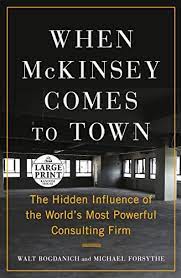You have /5 articles left.
Sign up for a free account or log in.
 When McKinsey Comes to Town: The Hidden Influence of the World's Most Powerful Consulting Firm by Walt Bogdanich and Michael Forsythe
When McKinsey Comes to Town: The Hidden Influence of the World's Most Powerful Consulting Firm by Walt Bogdanich and Michael Forsythe
Published in October 2022
For higher ed people, a book about McKinsey is not one that we read for general knowledge. We read about McKinsey for research.
Consulting firms like McKinsey are part of the fabric of how university strategies are constructed. Through the power of consultant ideas filtering into the subconsciousness of trustees, presidents, provosts and VPs—or through direct engagement with a big consultancy—what McKinsey and their peers think and do matters to higher education.
Will reading When McKinsey Comes to Town help university leaders make better decisions when evaluating possible engagement and reading the papers and think pieces of the major consulting companies? The answer to this question depends on how you approach the book.
My goal was to understand better the culture of McKinsey and other organizations that consult with higher ed. I’m curious about how the partners and analysts at higher ed consultancies think and how the companies they work for operate. This knowledge, I hope, will enable better decision-making and more informed judgment in evaluating potential future engagements and in reading the research that these organizations publish.
Over all, I’d say that When McKinsey Comes to Town is only partly successful as a user guide for consumers of big consultant services and ideas. The goal of the book is not to help organizations work more effectively with consultants but instead to uncover the impact and reach that McKinsey has had on businesses and governments.
One read of the book is a stinging indictment of a consulting firm whose stated values fail to line up with its track record. McKinsey seems to have been in the middle of a range of unsavory events over the past decades, from advising the House of Saud on maintaining its power to helping big pharma realize outsize profits from prescription opioids.
Paradoxically, for every chapter on McKinsey’s role in creating the housing bust (helping to invent collateralized securities) to environmental degradation (consulting for big coal companies), the firm comes off as more influential than immoral.
The intent of the authors is to expose the hidden influence that McKinsey has had on driving companies to prioritize profits over people and the environment and governments for introducing austerity measures that punished the poor and vulnerable and helped to supercharge inequality and wealth concentration. All of these stories of McKinsey being on the wrong side of history are disturbing. But the book reinforces, above all else, that McKinsey has a seat at the table.
In reading When McKinsey Comes to Town, I kept waiting for stories on when working with the firm was a win for all stakeholders. I suspect that the story would have been more nuanced if the authors had spoken to university clients and McKinsey people who work in their higher education practice.
There is no doubt room to question if the cost of working with McKinsey or one of their consulting peers is worth the investment. The answer will be, in some cases, yes, and in others, no.
What would have been most interesting to explore are the conditions in which partnering with McKinsey (or a peer) makes sense for a university. And if a school works with McKinsey, how might they get the most out of that investment?
When McKinsey Comes to Town may not provide a road map for higher people thinking of engaging a consultant to work on areas around institutional strategy. What the book does provide is insights into the culture and operating structure of McKinsey. These insights will help higher ed evaluate proposals and understand the specific findings and generalized research of the McKinseys of the world.
What is your experience working with McKinsey or any other big consulting firm?
What are you reading?




